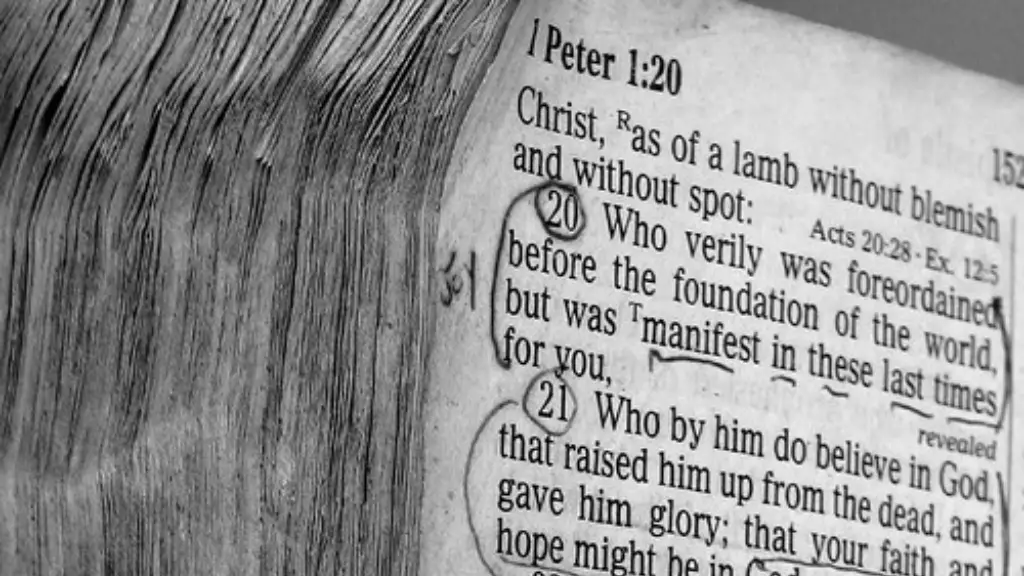Does The Bible Support Slavery?
Slavery has been a contentious issue in modern society, with people of different faith backgrounds frequently debating whether it is supported by the Bible. It is undeniable that slavery was one of the core aspects of many ancient cultures, but the intricacies of whether it was supported by Christianity is highly contested even today. While the Bible has often been used to argue that slavery is supported, most theologians now argue that this interpretation is misguided and based on incomplete facts.
One point to consider is that many of the Bible laws concerning slavery are not actually endorsements for owning slaves but regulations for those who already had them. These laws are intended to protect slaves from mistreatment, and are part of a larger context of human rights obligations. The Ten Commandments, for example, tie together human responsibility toward God – and toward other humans. Another factor to consider is that certain laws can in fact be interpreted as providing some sense of equal treatment to slaves — a powerful contrast at the time when slavery was normal and largely accepted without contest.
The Old Testament has several laws which are seen as being particularly pro-slavery by some. However, Deuteronomy 23:15-16, for example, advocates the right of ex-slaves to full rights as free citizens. Further, passages such as Proverbs 22:22-23 and Exodus 21:16 suggest a level of humanity that was not shared by its surrounding societies. The New Testament adds to this, with verses like Colossians 3:11 which talks of no division between ‘slave’ and ‘free’ in the eyes of God. Jesus’ short life also serves as an example: He also showed love and respect to everyone, regardless of their social standing in society.
Overall, the Bible could never be accurately described as ‘pro-slavery’. While the Bible does not unequivocally condemn slavery either, many of its laws and precepts of human mercy suggest that the ‘slave’ and the ‘free’ should be seen as equal in the eyes of God, and that harsh treatment of slaves is a moral failure.
Historical Context of Slavery
The ancient world was rife with slavery, and the notion of owning another human being was ubiquitous throughout the Mediterranean. Slavery took many forms, such as debt servitude and criminal servitude, as well as human trafficking and shear ownership. Most societies sustained slavery, including the ancient Hebrews, Babylonians and Greeks. As a result, slavery was a large part of the context that framed the original writings of the Bible.
Most of these societies operated on rigid class systems that is, the rich and powerful had the power to enslave. This is the context in which the Bible was written, and it is important to recognize that in order to gain a full understanding of why certain laws concerning slaves appear in the Bible. In other words, the Bible wasn’t written while slavery was a moral wrong – slavery was so embedded in the context of its writing that it was assumed to be part of daily life.
It is likely that the authors of the Bible took the position that because it was already a part of their world, their writings had to include laws governing the treatment of slaves. It shouldn’t be seen as endorsing the concept of slavery, but rather was written to provide rules to protect the enslaved. Ultimately, they drew the line at what was expected – and that line was being determined from a moral and ethical standpoint.
The Impact of Inaccurate Interpretations of the Bible
The belief that the Bible supports slavery has had far-reaching consequences throughout history. In the United States, for example, the interpretation of certain passages from the Bible were used to justify the enslavement of African Americans during the 18th and 19th centuries. The separation of people based on social standing was seen as a moral good, thanks in part to this phenomenon.
Even today, there are many who incorrectly argue that slavery is supported by the Bible. It is often used as a tool by those who wish to maintain power, who cite passages and verses to support their arguments. These misinterpretations of the Bible can lead to polarizing discussions, and it is important to understand the context of the original authors in order to provide an informed point of view.
The Counter-Argument of Slavery In the Bible
The majority of biblical experts do not support the notion that the Bible endorses slavery. Many suggest that it is based on a more nuanced reading of the scriptures, such as the concept of ‘servitude’ rather than complete ownership. This is mirrored in the New Testament, in which masters are instructed to ‘render under unto Caesar the things which are Caesar’s’. This could be interpreted as a rendering of just and moral due.
Other experts refute the notion of slavery in the Bible completely. They point to the many Bible teachings which advocate for the equal treatment of all individuals, regardless of their social standing. They also point out that nowhere in the Bible does it condone any form of mistreatment or coerced servitude. Overall, these counter-experts point to a very different sociological context than the one which is commonly accepted by many.
Modern Perspectives on Slavery
In modern times, the debate around slavery and the Bible is far less polarizing than it once was. Most theologians today agree that the Bible and its teachings do not support slavery and that mistreatment of slaves is a clear moral wrong. This view is increasingly shared by many mainstream churches, with majority of denominations rejecting the notion of slavery and advocating for the human rights of all individuals.
However, there is still a pervasive notion that the Bible does in fact condone slavery. This misunderstanding stems from an incomplete reading of the scriptures, as well as an ignorance of history and sociological context in which it was written. The modern debate over the issue serves to emphasize the importance of gaining a full understanding of any difficult issues rather than relying on one’s personal opinion alone.
The Influence of Religion in Addressing Slavery
The issue of slavery has been used to rally the religious community for centuries. Through the power of religion, those opposed to slavery have sought to address this moral wrong definitively, relying on interpretations of the Bible that support an anti-slavery stance. These interpretations are often used to form the foundation of movements against slavery.
Religion has proven to be an effective tool in changing public opinion on slavery. Over the centuries, there have been many movements initiated by religious organizations that seek to end the practice of slavery, although these efforts have had mixed success. Today, religious organizations continue to use the power of scripture to spread their message and educate others on the true meaning of the words of the Bible.
Analysis of Slavery From a Biblical Perspective
An analysis of the Bible from a liberal or progressive perspective suggests that the Bible does not in fact support slavery. Rather, its laws governing the slave and the free demonstrate a level of humanity that was less than common at its time. Unlike many ancient societies, the Bible provided a moral and ethical foundation that protected the rights of the slave and provided pathways for freedom.
The Bible also reinforced the notion of human equality, as Jesus often sought to provide a voice to those who were excluded from society. It is through this lens that many interpret certain passages of the Bible that appear to sanction slavery in order to see it from a more humane point of view. Ultimately, the Bible should never be seen as endorsing slavery – rather, it should be seen as its moral opponent.
Importance of Proper Interpretation of Biblical References
In order to gain a deeper understanding of the Bible’s true stance on slavery, it is important to continually analyze certain passages and verses in order to understand the full context in which they were written. Even if slavery as a practice was not explicitly condemned, it was opposed on a moral basis. Ultimately, these interpretations show that the Bible was far ahead of its time when it came to the treatment of slaves.
In this light, the Bible should be seen not as an enabler of the horrors of slavery, but as an advocate for morality and justice. By interpreting this great book accurately, one can gain a better understanding of its teachings and use them to support continued calls for the end of slavery in all forms.
The Relationship Between Religion and Slavery
The relationship between religion and slavery is complex and often controversial. Proponents of slavery have long used religious texts to justify their views, and even today there are those who refuse to accept that the Bible does not in fact support this practice. While modern religious organizations are typically in agreement that the Bible does not condone slavery, it is still imperative to study the Bible and its various interpretations in order to gain a full understanding of the issue.
It is also worth noting that religion has often been employed to support movements against slavery. The moral teachings of the Bible have long been a source of inspiration and guidance for those looking to end the practice, and, along with the organized efforts of some religious groups, has proved to be an effective tool in raising awareness and mobilizing the anti-slavery cause.
Applying Biblical Teachings to Modern Day Slavery
Modern day slavery takes many forms, and these can range from human trafficking to bonded labor and beyond. It is a moral crime that continues to this day, and its victims are often the most vulnerable members of society. In order to truly help these individuals, it is important to seek an understanding of how to apply biblical teachings to modern day slavery.
The Bible teaches values of equality and justice, and these are particularly relevant when seeking to end modern day slavery. By incorporating these teachings into efforts to combat slavery in all its forms, we can strive to create a fairer and more equitable world for all people. This includes lifting those living in slavery out of their suffering and helping to secure them a better future.
Enduring Impact of the Bible on Slavery
The debate over slavery and the Bible has been ongoing for centuries, and continues to this day in both modern society and in certain religious circles. Even though contemporary interpretation of the Bible suggests that slavery has no place in it, its legacy continues to cast a long shadow on the debate. This is due to the power of its message and its impact on those who interpret its many subtle nuances.
Going forward, it is important to try and view the Bible objectively, and to respect its wide range of interpretations as opposed to seeking out dogmatic conclusions. Through this, we can gain a better understanding of what it truly has to say on the contentious issue of slavery.





